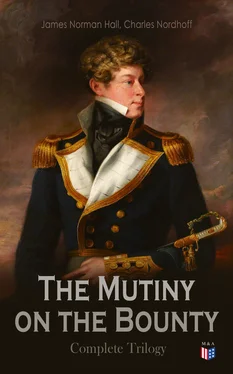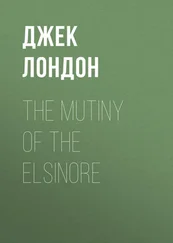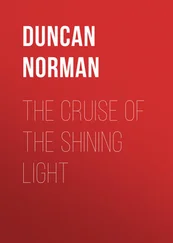Table of Contents
Now that we were at sea again, I had time to observe the change that had come over the ship’s company as a result of our long island sojourn. In colour we were almost as brown as the Indians, and most of us were tattooed on various parts of our bodies with strange designs that added to our exotic appearance. The Tahitians are wonderfully skilled at tattooing, and although the process of acquiring it is both slow and painful, there were few of the men who had not been willing to undergo the torture for the sake of carrying home such evidence of their adventures in the South Sea. Edward Young was the most completely decorated of the midshipmen. On either leg he carried the design of a coconut tree, the trunk beginning at the heel and the foliage spreading out over the fleshy part of the calf. Encircling the thighs were wide bands of conventionalized design, and on his back he had the picture of a breadfruit tree, done with such spirit that one could all but hear the rustle of the wind through its branches.
In addition to such pictures, there was scarcely a man on the ship who had not acquired some words and phrases of the Tahitian language, which they took care to use in their talk with one another. A few had become remarkably proficient, and could carry on conversations in which scarcely a word of English was to be heard. All of them had pieces of the Indian cloth, and it was a curious sight, in the early mornings when they were washing down the decks, to see them at their work dressed only in turbans of tapa, with a strip of the same material about their loins, and jabbering away with great fluency in the Indian tongue. An Englishman fresh from home would hardly have recognized them as fellow countrymen.
There was an inward change as noticeable to any thoughtful observer as these outward ones. Duties were performed as usual, but there was little heartiness displayed, and this applied to some of the officers as well as to the men. Never, I fancy, has one of His Majesty’s ships been worked homeward, after long absence, with less enthusiasm.
I was talking of this matter one day with Mr. Nelson, who was always to be found during the daylight hours in the great cabin, looking after his beloved breadfruit plants. I felt vaguely uneasy at this time, and it was always a comforting experience to talk with Mr. Nelson. He was one of those men who are truly called the salt of the earth, and was a rock of peace in our somewhat turbulent ship’s company. I confessed that I was disturbed, without knowing exactly why, at the way the ship’s work was going on. Nelson thought there was nothing to be concerned about.
“Does it seem strange to you, my dear fellow, that we should all feel a little let down after our idyllic life at Tahiti? I am surprised that the men show as much willingness as they do. My own feelings as I think of England ahead of us and Tahiti behind are decidedly mixed ones. Yours must be, too.”
“I admit that they are,” I replied.
“Imagine, then, how the men must feel, who have so little to go home to. What have they to expect at the end of the voyage? Before they have been a week ashore most of them may be seized by some press gang as recruits for another of His Majesty’s ships. Who knows what the situation may be by the time the Bounty reaches England? We may be at war with France, or Spain, or Holland, or heaven knows what power; and in that case, alas for any poor seamen arriving in a home port! They won’t even be given the chance to spend their back pay. The sailor leads a dog’s life, Byam, and no mistake.”
“Do you think war with France is likely?” I asked.
“War with France is always likely,” he replied, smiling. “If I were an A.B. I should curse the thought of any war. Think what a paradise Tahiti has been for our men. For once in their lives they have been treated as human beings. They have had abundant food, easy duties, and unlimited opportunities for the sailor’s chief distraction, women. I confess that I was surprised, before we left Tahiti, that the lot of them didn’t take to the hills. Certainly I should have done so had I been in any of their places.”
As the days passed, and we left Tahiti farther and farther astern, the memory of our life there seemed like that of a dream, and gradually, one by one, we fell into the old routine. No unhappy incidents occurred to mar the peace of that period. Captain Bligh took his regular turns on the quarter-deck, but he rarely spoke to anyone, and most of his time was spent in his cabin, where he was busy working on his charts of the islands. So all went quietly enough until the morning of April 23, when we sighted the island of Namuka, in the Friendly Archipelago. Bligh had been here before, with Captain Cook, and it was his intention to replenish our wood and water before proceeding in the direction of Endeavour Straits.
The wind being to the southward, we had some difficulty in making the land, and it was not until late afternoon that we came to anchor in the road, in twenty-three fathoms. The island was much less romantic in appearance than Tahiti or any of the Society Islands that we had seen, but I was conscious of the same feeling of awe and wonder I had experienced elsewhere as I looked upon lands which only a handful of white men had ever seen, and whose very existence, to say nothing of their names, was unknown to people at home.
On the morning of the twenty-fourth we weighed and worked more to the eastward, and again anchored a mile and a half from shore, at a more convenient place for our watering parties. By this time the arrival of the ship was known far and wide on shore, and the Indians were arriving not only from various parts of Namuka, but from neighbouring islands as well. We had scarcely come to our new anchorage before we were surrounded with canoes, and our decks were so filled with people that we had difficulty in performing our duties. At first the confusion was great, but order was established when two chiefs came aboard whom Bligh remembered from his visit in 1777. We were able to make them understand that the decks must be cleared, and they set about it in so resolute and impetuous a manner that soon all of the Indians, except those in the chiefs’ retinues, were again in their canoes. Captain Bligh then called me to him to act as interpreter, but I found that my study of the Tahitian language was of little service here. The Friendly Island speech, although it has points of resemblance, differs greatly from the Tahitian. However, with the aid of signs and an occasional word or phrase, we explained our purpose in coming, and, the chiefs having shouted some orders to their people, most of the canoes made speedily for shore.
It was Captain Cook who had given the name, “The Friendly Islands,” to this archipelago, but my own impressions of its inhabitants were far from favourable. They resembled the Tahitians in stature, the colour of the skin and hair, and it was plain that they belonged to the same great family; but there was an insolent boldness in their behaviour lacking in the deportment of the Tahitians. They were thieves of the worst order and, if offered the slightest opportunity, would seize whatever loose article lay nearest and leap overboard with it. Christian was strongly of the opinion that they were not to be trusted in any respect, and suggested that a strong guard accompany the parties to be sent ashore for wood and water. Captain Bligh laughed at the notion.
“Surely you’re not afraid of the beggars, Mr. Christian?”
“No, sir, but I think we have reason to be cautious in our dealings with them. In my opinion....”
He was not permitted to finish.
“And who’s asked you for your opinion? Damme! If I haven’t an old woman for my second-in-command! Come, Mr. Nelson, we must do something to reassure these timid souls,” and he went down the ladder to the cutter that was waiting to row him ashore. Mr. Nelson followed—he was to collect some breadfruit plants to replace several that had died during the voyage—and the party, including the two chiefs, set out for the beach.
Читать дальше











